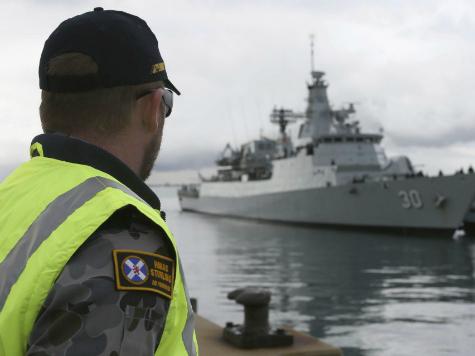According to The Wall Street Journal, the U.N., always on the lookout to chastise or punish Western nations for protecting themselves, is criticizing Australia for its tough laws regarding immigration into its own country.
The criticism centers on 150 ethnic Tamils fleeing Sri Lanka to look for asylum in Australia. The 150 Tamils were intercepted at sea by the Australian navy, which was reportedly considering transferring them to the Sri Lankan navy.
A civil war had raged until 2009 in Sri Lanka as the Tamil Tiger rebels warred against the government in order to secure independence for the country’s northern Tamil minority.
Prime Minister Tony Abbott would not confirm whether his navy would turn the Tamils over to the Sri Lankan navy, acknowledging, “Sri Lanka is not everybody’s idea of a perfect country… It is a peaceful country and all of us should be grateful the horrific civil war is well and truly over.”
Human-rights and refugee organizations made contact with the Tamils and reported the alleged transfer. The U.N.’s refugee agency, UNHCR, pontificated that it had “profound concern” about the alleged interception at sea, even though there has been no confirmation:
When boats presumed to be carrying asylum-seekers are intercepted, UNHCR’s position is that requests for international protection should be considered within the territory of the intercepting state, consistent with fundamental refugee protection principles. If protection issues are raised, they should be properly determined through a substantive and fair refugee status determination procedure to establish whether any one of them may be at risk of persecution or other serious human rights violations.
Australia’s government normally eschews comment regarding asylum operations at sea in order to avoid channeling intelligence to people-trafficking organizations that might take advantage of such information. Abbott did say, “I’m confident everything that is happening is quite consistent with safety at sea and with our international obligations.”
An Australian human-rights lawyer, Julian Burnside, claimed that a boat left India with 153 Tamils on board. He added that the boat had neared Christmas Island and established communication with supporters on June 28 but was silent over the weekend. Rights groups claimed there was still another boat that left Sri Lanka and reached Cocos Islands territory but was then intercepted.
Burnside claimed the 150 Tamils included 69 women and children and were seeking asylum because of systematic abuse, torture, and sexual violence in northern Sri Lanka. Another international-rights lawyer, Yasmin Sooka, has asserted that torture has been used by the Sri Lankan government, including victims branded with hot metal rods, burned with lighted cigarettes, lacerated, and water boarded.
The Sri Lankan government, run by the Sinhalese majority of the country, insists that it treats the Tamils normally. Abbott has approved giving navy patrol boats to Sri Lanka’s government to help curb asylum seekers coming to Australia and claimed that the government has been improving on human rights issues.
Abbott’s tougher approach to immigration helped him get elected last year; a majority of Australians supported him.
Australia’s Greens party has ripped Abbott’s policies, asserting that they violated non-refoulement obligations under the U.N. Convention Against Torture and the International Covenant on Civil and Political Rights. Greens leader Christine Milne said, “To send the persecuted people back to the persecutors is absolutely wrong and in contravention of all international law, but also in contravention of just plain human decency.”
Just last month, Abbott’s government offered new laws that would force asylum seekers to prove they had a greater-than-50% risk of serious harm, including torture or death, for them to seek asylum in Australia. Immigration Minister Scott Morrison said Thursday the government’s immigration laws were stemming the number of immigrants arriving from South Asia, Iran, and the Middle East. He reported that there had been no successful arrivals in the last six months, compared to the same period one year earlier under the Labor government, when more than 12,000 asylum seekers came to the country.

COMMENTS
Please let us know if you're having issues with commenting.